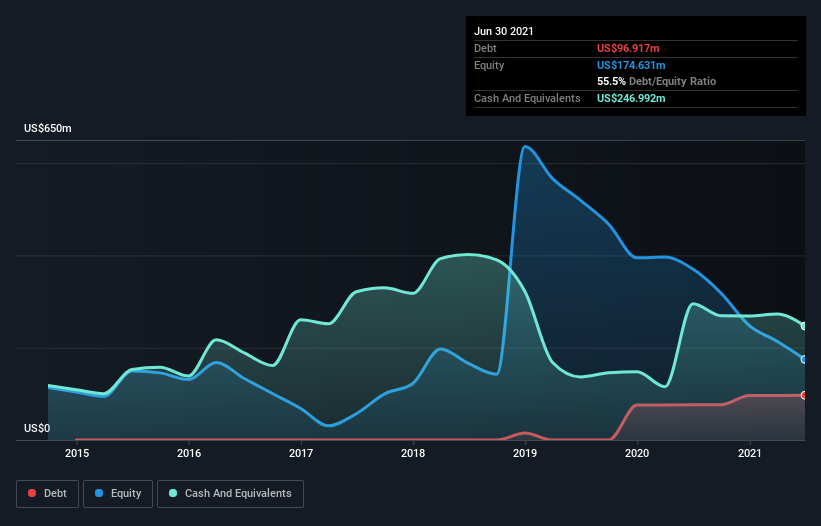Health Check: How Prudently Does Akebia Therapeutics (NASDAQ:AKBA) Use Debt?
David Iben put it well when he said, 'Volatility is not a risk we care about. What we care about is avoiding the permanent loss of capital.' It's only natural to consider a company's balance sheet when you examine how risky it is, since debt is often involved when a business collapses. As with many other companies Akebia Therapeutics, Inc. (NASDAQ:AKBA) makes use of debt. But the real question is whether this debt is making the company risky.
Why Does Debt Bring Risk?
Debt and other liabilities become risky for a business when it cannot easily fulfill those obligations, either with free cash flow or by raising capital at an attractive price. Part and parcel of capitalism is the process of 'creative destruction' where failed businesses are mercilessly liquidated by their bankers. However, a more common (but still painful) scenario is that it has to raise new equity capital at a low price, thus permanently diluting shareholders. Of course, the upside of debt is that it often represents cheap capital, especially when it replaces dilution in a company with the ability to reinvest at high rates of return. The first thing to do when considering how much debt a business uses is to look at its cash and debt together.
Check out our latest analysis for Akebia Therapeutics
What Is Akebia Therapeutics's Debt?
The image below, which you can click on for greater detail, shows that at June 2021 Akebia Therapeutics had debt of US$96.9m, up from US$76.3m in one year. But on the other hand it also has US$247.0m in cash, leading to a US$150.1m net cash position.
A Look At Akebia Therapeutics' Liabilities
The latest balance sheet data shows that Akebia Therapeutics had liabilities of US$165.6m due within a year, and liabilities of US$271.6m falling due after that. Offsetting this, it had US$247.0m in cash and US$36.9m in receivables that were due within 12 months. So its liabilities outweigh the sum of its cash and (near-term) receivables by US$153.3m.
This deficit isn't so bad because Akebia Therapeutics is worth US$528.8m, and thus could probably raise enough capital to shore up its balance sheet, if the need arose. But it's clear that we should definitely closely examine whether it can manage its debt without dilution. While it does have liabilities worth noting, Akebia Therapeutics also has more cash than debt, so we're pretty confident it can manage its debt safely. When analysing debt levels, the balance sheet is the obvious place to start. But ultimately the future profitability of the business will decide if Akebia Therapeutics can strengthen its balance sheet over time. So if you're focused on the future you can check out this free report showing analyst profit forecasts.
In the last year Akebia Therapeutics had a loss before interest and tax, and actually shrunk its revenue by 35%, to US$222m. To be frank that doesn't bode well.
So How Risky Is Akebia Therapeutics?
We have no doubt that loss making companies are, in general, riskier than profitable ones. And the fact is that over the last twelve months Akebia Therapeutics lost money at the earnings before interest and tax (EBIT) line. Indeed, in that time it burnt through US$192m of cash and made a loss of US$300m. With only US$150.1m on the balance sheet, it would appear that its going to need to raise capital again soon. Overall, we'd say the stock is a bit risky, and we're usually very cautious until we see positive free cash flow. There's no doubt that we learn most about debt from the balance sheet. But ultimately, every company can contain risks that exist outside of the balance sheet. To that end, you should be aware of the 2 warning signs we've spotted with Akebia Therapeutics .
If you're interested in investing in businesses that can grow profits without the burden of debt, then check out this free list of growing businesses that have net cash on the balance sheet.
This article by Simply Wall St is general in nature. We provide commentary based on historical data and analyst forecasts only using an unbiased methodology and our articles are not intended to be financial advice. It does not constitute a recommendation to buy or sell any stock, and does not take account of your objectives, or your financial situation. We aim to bring you long-term focused analysis driven by fundamental data. Note that our analysis may not factor in the latest price-sensitive company announcements or qualitative material. Simply Wall St has no position in any stocks mentioned.
Have feedback on this article? Concerned about the content? Get in touch with us directly. Alternatively, email editorial-team (at) simplywallst.com.

 Yahoo Finance
Yahoo Finance 
